Launched in 2017, Food Literacy for All is a community-academic partnership course based at the University of Michigan. Structured as an evening lecture series, Food Literacy for All features different guest speakers each week to address challenges and opportunities of diverse food systems. The course is free and open to the public.
Food Literacy for All 2024 began on January 16th with an in-person event at UMMA. The class will be available on Zoom starting January 23rd. Video recordings will be published after each class on the SFSI website, YouTube, and our social media pages.
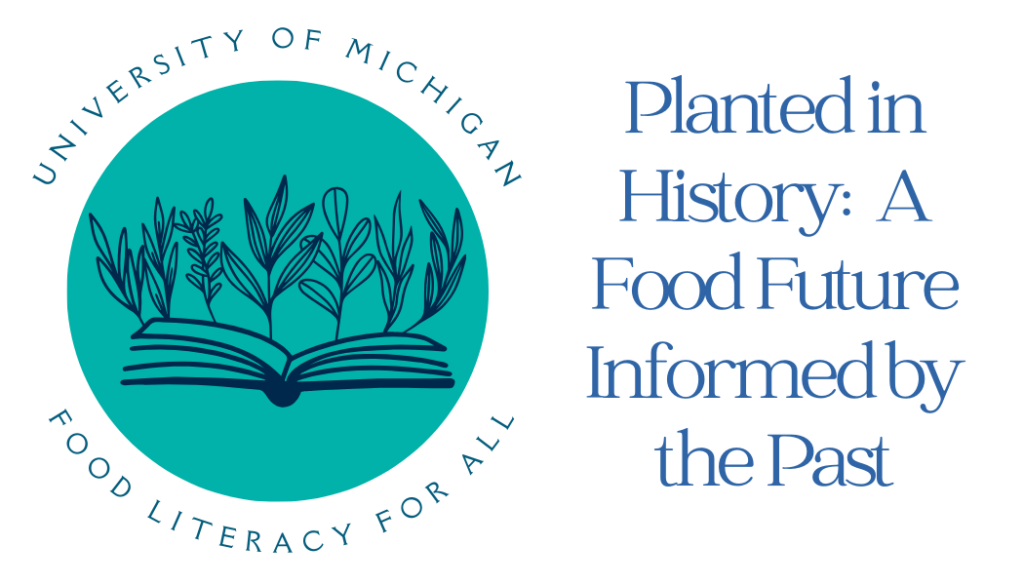
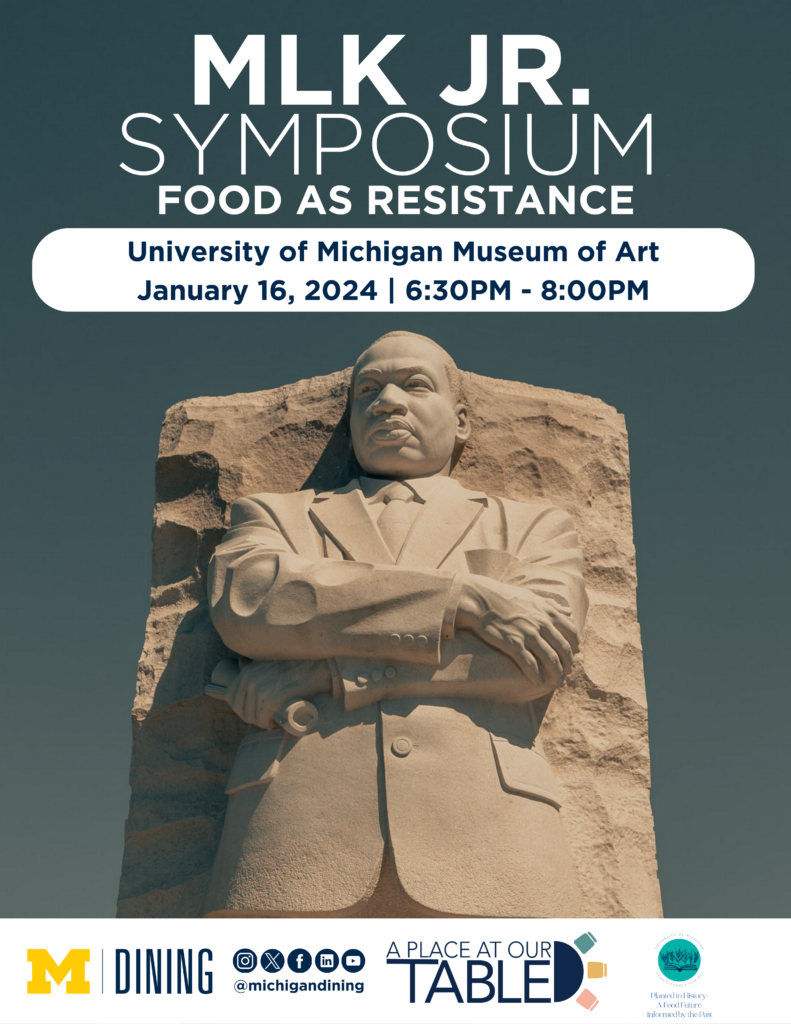
Thanks for joining us!
As part of the MLK Jr. Symposium at the University of Michigan, Michigan Dining and Food Literacy for All hosted “Food as Resistance.” The event was on Tuesday, January 16, 2024, at the University of Michigan Museum of Art (UMMA). The event was free and open to the public. Event doors opened at 6pm for food prepared by Michigan Dining Chefs. Shiloh Maples spoke at 6:30pm, and the event was livestreamed.
Upcoming 2024 Food Literacy for All Speakers
| Date | Speaker | Talk Title |
|---|---|---|
| January 16 *In person at UMMA* | Shiloh Maples | “Food as Resistance” |
| January 23 | Christy Spackman | “The Taste of Water” |
| January 30 | Labor Organizers panel: Laura MacIntyre (ROC United), Laura Nadal (Community Organizer), Hannah Whitbeck (Starbucks workers united), Celize Christy (HEAL Alliance) | “There’s Power in a Union: Organizing Workers in the Food System” |
| February 6 | shakara tyler, Joe Ciadella, Jerry Hebron, gabrielle knox | The History and Future of Food in Detroit |
| February 13 | Helen Zoe Veit | “Small Appetites, history of children’s food culture” |
| February 20 | Clarenda (Farmer Cee) Stanley | “Heritage Farming” |
| March 5 | Ashanté M. Reese | “How Nostalgia Shapes Food Stories from Deanwood to Sugarland” |
| March 12 | Reem Kassis | “Cuisine in Context: The History, Evolution, and Challenges of Palestinian Food” |
| March 19 | Jahi Chappell | “Beginning to End Hunger: Lessons from Belo Horizonte Brazil” |
| March 26 | Amy Bentley, Bob Valgenti, Chad Ludington, Charlotte Biltekoff | “Food Fights: How History Matters to Contemporary Debates” |
| April 2 | Marcia Chatelain | “Franchise: The Golden Arches in Black America, A Talk about Food and Racial Justice” |
| April 9 | Blain Snipstal | “Natural Building and Sustainable Agriculture” |
| April 16 *In person at 140 Lorch Hall* | Ten UM Faculty | “Fast Food for Thought is an annual event where a group of interdisciplinary UM SFSI faculty and staff affiliates give a series of 5 minute talks related to food and/or agriculture.“ |
| April 23 | shakara tyler, Margot Finn | Class synthesis |

Learn more about Food Literacy for All
The University of Michigan Sustainable Food Systems Initiative (SFSI) hosts a unique community-academic partnership course called Food Literacy for All each winter semester. Structured as an evening lecture series, Food Literacy for All features different guest speakers each week to address diverse challenges and opportunities of both domestic and global food systems. By bringing national and global leaders to campus, the course aims to ignite new conversations and deepen existing commitments to building more equitable, health-promoting, and ecologically sustainable food systems.
From 2017-2023, 1,060 University of Michigan students have taken Food Literacy for All for credit, over 3,500 community members have attended the class, several hundred people have participated in in-person events in Detroit, and over 34,000 others from across the U.S. and around the world who have engaged through a range of virtual formats, including livestream events in Detroit, Kalamazoo, and East Lansing. The course has had lasting impacts on student learning, community perspectives, and partnerships that have formed among former speakers and with SFSI, and attracted widespread media attention.

Unlike most courses at UM, Food Literacy for All is co-designed, co-planned, and co-taught by a team of UM faculty and staff and community leaders in Detroit. The course team also includes rotating SFSI coordinators, UM graduate student instructors (GSIs), and LSA Technology Services representatives who have supported the course both academically and logistically. See below to learn more about the leadership team from 2017-2023:
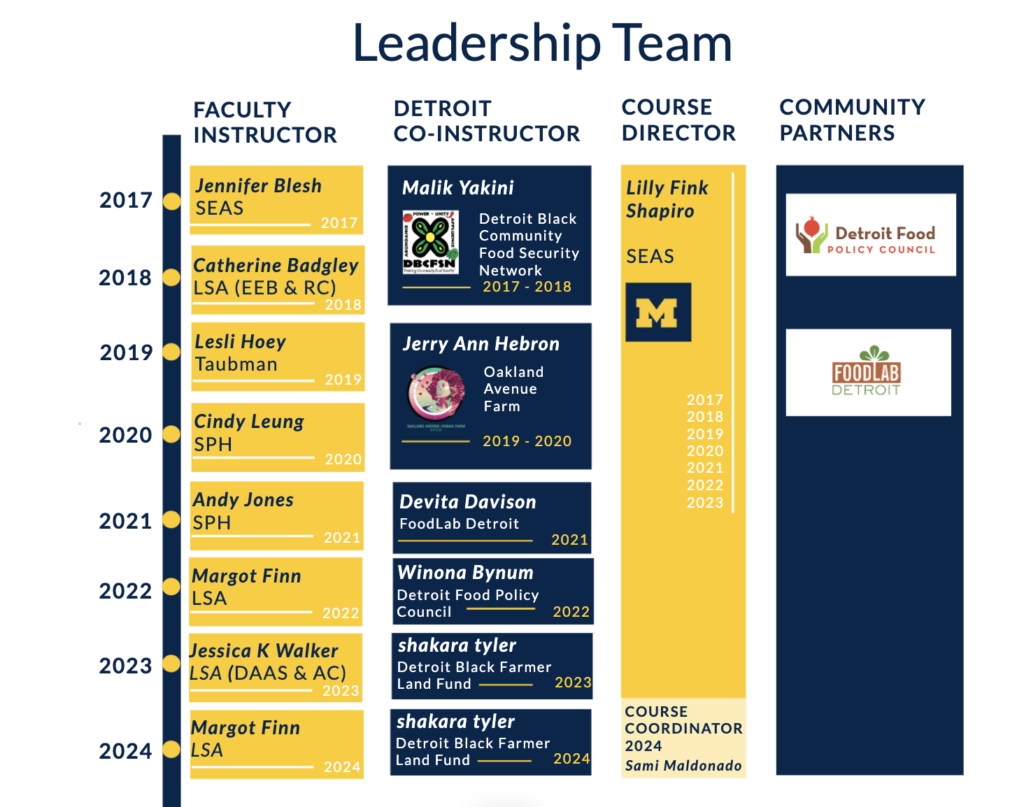

The course enrollment has continued to grow each year, with the highest enrollment of 235 students in 2023. Student interest in the course continues to increase as the course gains reputation and credibility. One unique aspect of the course is that it attracts an interdisciplinary mix of undergraduate and graduate students from across the University; over five semesters, 68% of enrolled students have been undergraduate, and 32% have been graduate students. The majority of enrolled students are from the College of Literature, Science and the Arts (LSA), the School of Public Health (SPH), and the School for Environment and Sustainability (SEAS), although students from over 14 schools have taken the class.
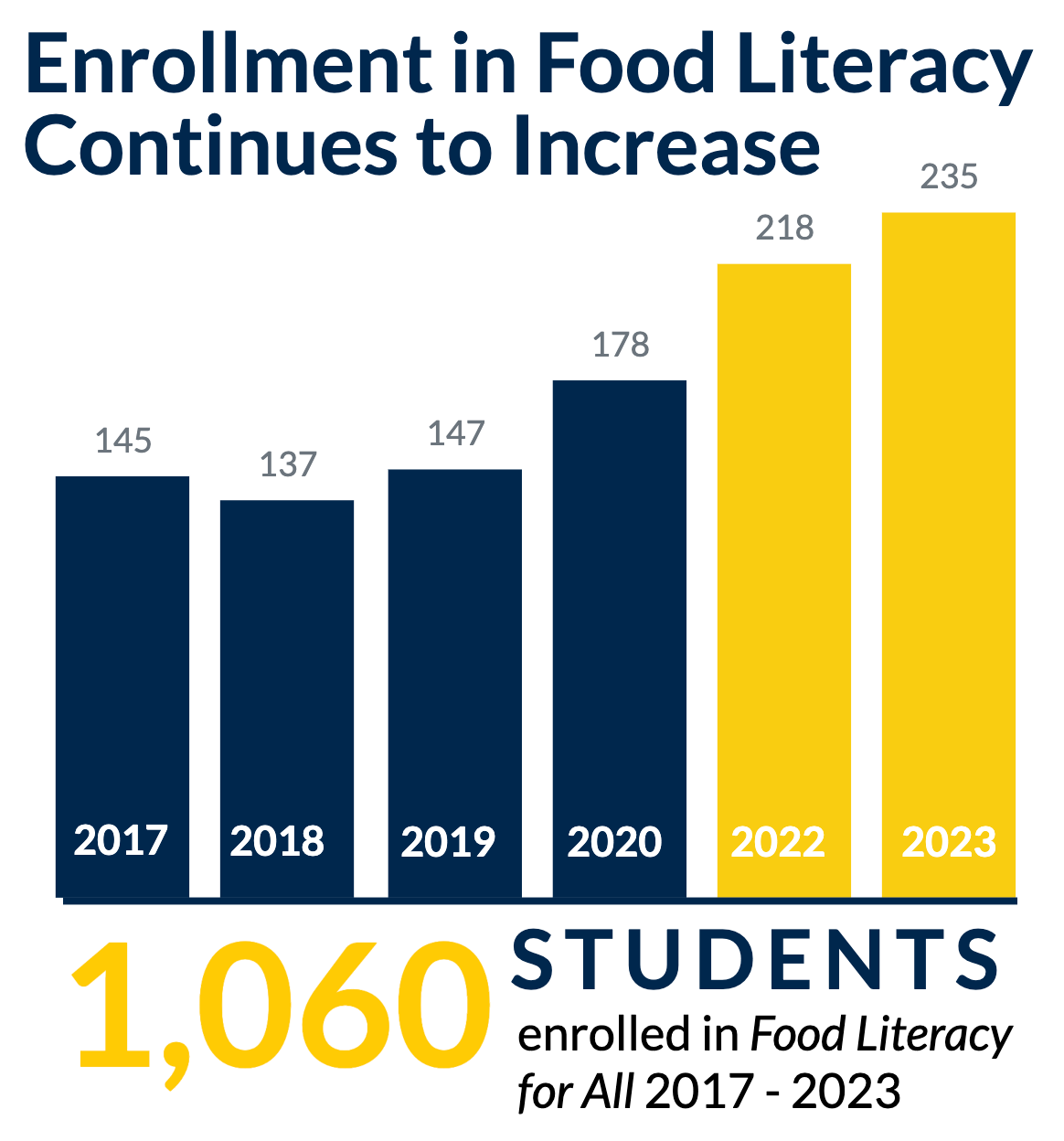

From 2017-2023, Food Literacy for All has engaged over 3,900 community members. Prior to the pandemic, this included people who attended the class in-person in Ann Arbor and through other community events with the guest speakers and partner organizations. For example, Frances Moore Lappé participated in a downtown Detroit event with the Detroit Food policy Council (2017), Fernando Funes joined a panel discussion with Detroit urban agriculture growers (2018), Wayne Roberts led two workshops, one hosted by the Detroit Food Policy Council and another by the Michigan Local Food Council Network (2019), Leah Penniman joined a group of Detroit based women chefs and farmers for lunch in Detroit (2020), and Nicole Taylor spoke at an African American FoodWays dinner hosted by Zingerman’s (2020).
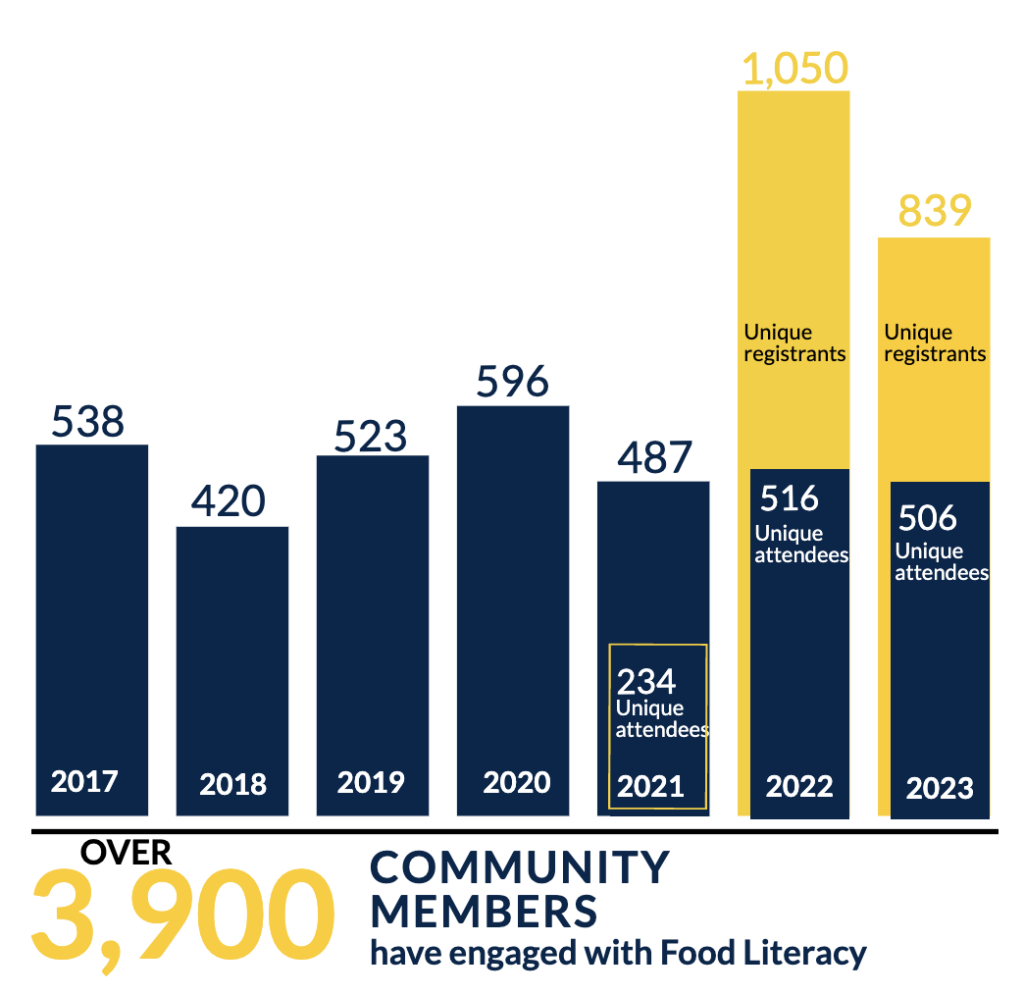
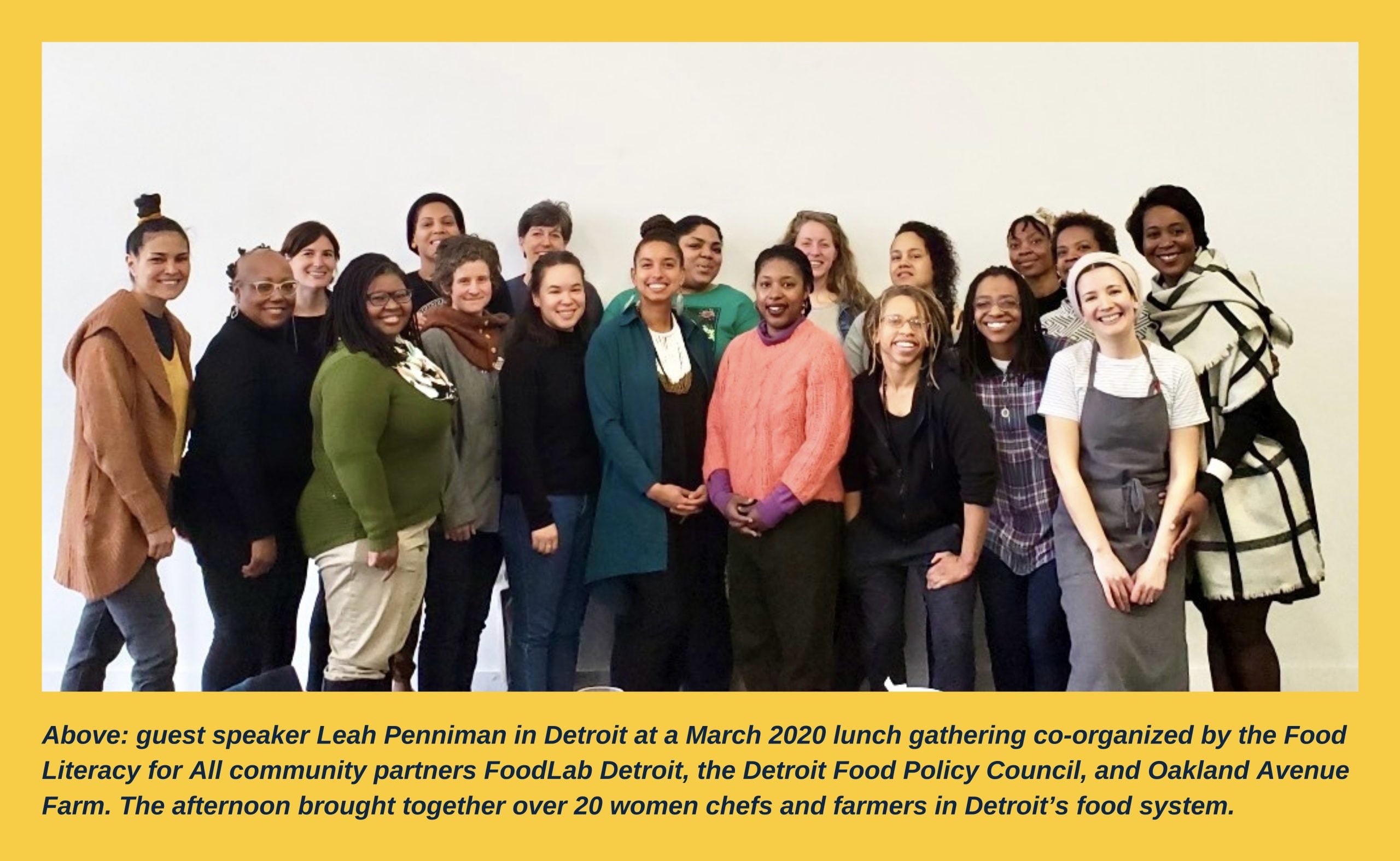
The course engaged people of varying racial and educational backgrounds (see table below).
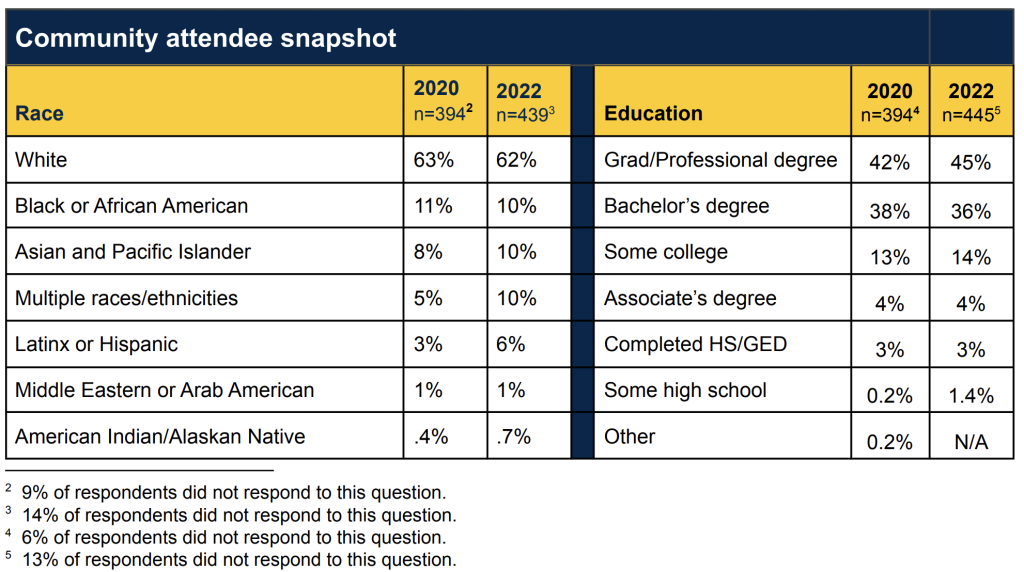
Community attendees self-identified in a variety of ways. For several years in a row, the most common jobs/affiliation noted by community attendees were non-profit professional (ranging from 8% to 19%), educator (14% to 15%), food systems/community advocate (13%), consultant (12%), health care provider (4 to 6%), grower/farmer/producer (2% to 9%), and public health professional (4% to 5%). Other attendees identified as food-service professionals, researchers, government officials, funders, planners, grocers, or media professionals.
Each Food Literacy for All session was recorded and published on YouTube, the SFSI website, and SFSI social media within one week. As of April 2023, Food Literacy for All videos have been viewed over 57,000 times. Youtube data over the last six years show that viewers tune in from around the world, including the Netherlands, Denmark, Canada, Germany, Belize, France, the United Kingdom, Italy, Sweden, South Africa, Australia, and Bangladesh. The live-streamed sessions in 2017 and 2018 also engaged an international audience, as people tuned in from Germany, Great Britain, Ghana, India, Japan, Morocco, and Peru. Viewing of videos from past years grows each year, indicating that people continue to engage with the videos and that they remain relevant.
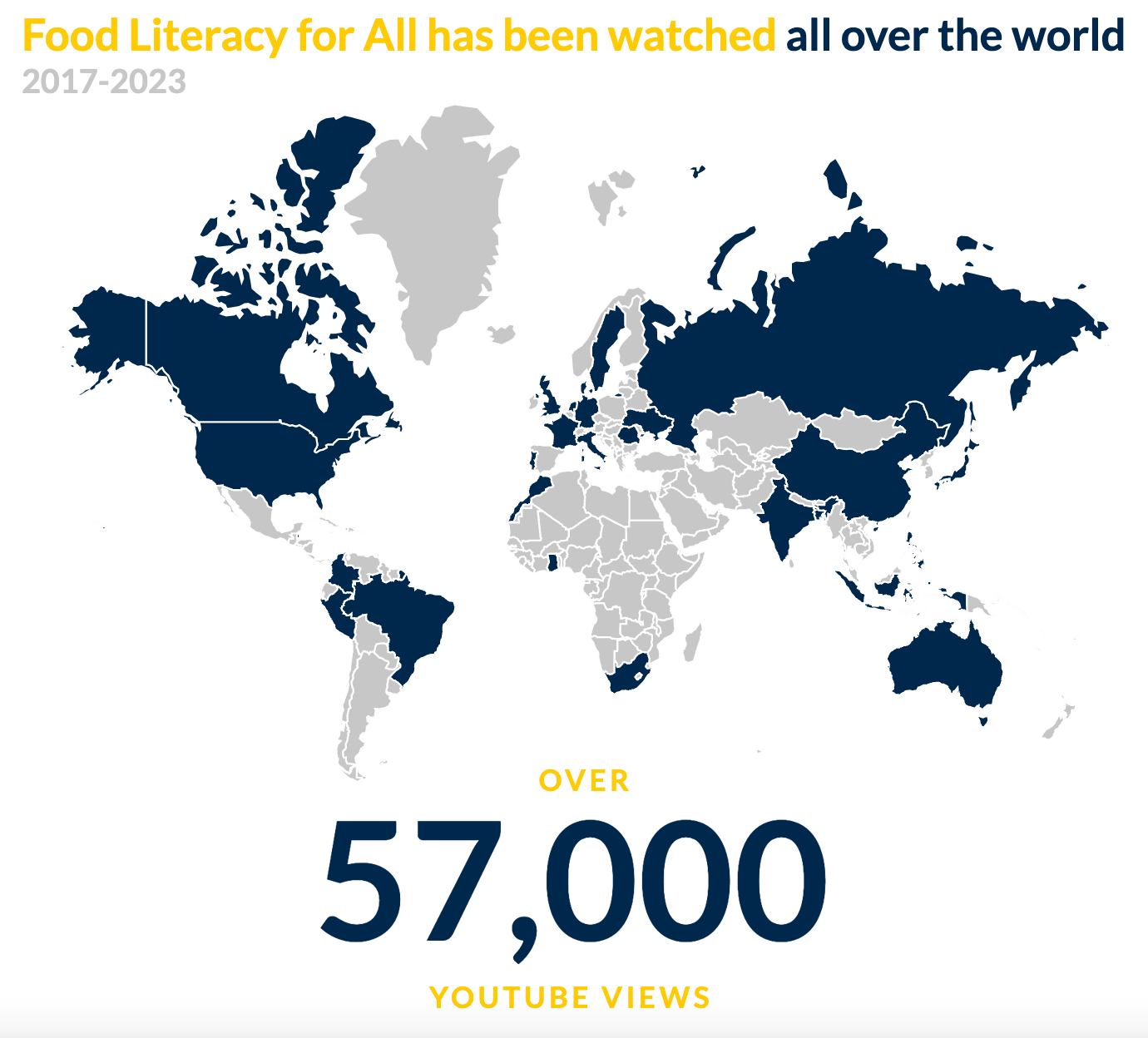
Since the 2017-2020 versions of the course were based in Ann Arbor, it is notable that almost half (40%) of community attendees who attended class in those years indicated they were not from Ann Arbor (n = 496). 18% of community attendees stated they were from Metro Detroit, and 9% from the City of Detroit. During the virtual version in 2022, people joined the live Food Literacy class from 37 states and 11 countries.
Most community members attend more than one class session. In 2020, 75% of respondents attended “all or most of the sessions.” Ten percent attended 2 – 7 sessions, 9% could not attend, but watched videos remotely, and only 5% attended only one session. A small percentage of community members attended the Tuesday evening course but did not complete the RSVP form, and others may have RSVP’d but did not attend in-person. In 2020, over half (53%) of community attendees had no affiliation with the University.

Food Literacy for All increased overall interest in Sustainable Food Systems for both students and community members. Similar to other years, 92% of the Food Literacy for All students who enrolled in the course in 2022 indicated that the course increased their interest in learning more about sustainable food systems. Notably, 70% of survey respondents agreed that Food Literacy for All has had a significant impact on shaping their work, studies, or future aspirations.

Food Literacy for All builds capacity for local food system leaders by providing a weekly opportunity to step back from their daily work challenges and reflect on larger systems that take place on community, national, and global levels. Multiple community members reflected on their own work and how they could change as a result of this class, noting, for instance, how “This course has inspired me to center equity and leaders of color in my own teaching and research – and I plan to use the videos in my courses.” Similarly, a community attendee reflected, “I have grown to respect my work more (small-scale suburban farmer).” Yet another community attendee of Food Literacy for All for multiple years reflected that “[The course] inspired me to go back and finish my Bachelors degree 25 years after I quit.”
Other impacts of the course can be measured by lasting relationships with invited speakers. For example, one former Food Literacy student is now working with 2019 Food Literacy speaker Samina Raja in Buffalo, NY. One year after Saru Jayaraman spoke in Food Literacy in 2017, she contacted the course leadership team, inviting us to co-organize a campus event featuring Jane Fonda and Lily Tomlin to raise awareness around the wages of tipped restaurant workers. Community co-instructor Jerry Ann Hebron has maintained a meaningful relationship with 2019 Food Literacy speaker Shirley Sherrod, which may have implications for land ownership in Detroit. Director of the Food & Environment Program at the Union of Concerned Scientists, Ricardo Salvador, served as the keynote for the 2019 Detroit Food Summit as a direct result of his participation in Food Literacy for All.
Similar to other years, 92% of the Food Literacy for All students who enrolled in the course in 2022 indicated that the course increased their interest in learning more about sustainable food systems. Over 90% of attendees agree that this course reaffirmed their career choice in sustainable food systems (36%), increased their awareness of important food justice issues (27%), or made them want to take action in their community (19%).
When asked an open-ended question about how the course impacted their current work, studies, or future aspirations, some students shared about wanting to grow their own food and/or source local food, support communities of color in their fight for equitable food systems and center racial justice and sustainable food systems in their future careers, volunteer work, and life.

Other students “hope to go into a career in agriculture because of this course” or have gained new perspectives for their careers. As one student reflected,
“[Food Literacy for All] has made me more invested in public health and nutrition. I want to be a doctor, but this course has given me perspective into medicine beyond the hospital, and how food plays such a great role in sustenance beyond just a caloric value.” (2020)
Food Literacy for All also complements existing food systems classes on campus, especially courses associated with the undergraduate Food and Environment Minor in the Program in the Environment and the Graduate Certificate in Sustainable Food Systems. For example, several instructors have built Food Literacy for All into their syllabi by offering extra credit to students who attend particular sessions. Instructors at Universities across the country, such as UC Santa Barbara have also assigned Food Literacy for All videos as a part of their syllabus.
For most UM students, Food Literacy for All is the only time in their academic career that they will sit in class next to farmers, nonprofit professionals, chefs, and other community members. Over one third (37%) of students enrolled in the 2020 course agreed that “the mix of students and community attendees in the audience” was one of the most valuable parts of the course and 92% of attendees agreed or strongly agreed that “the participation of community members enhanced their learning.” The other aspects attendees found most valuable were the mix of activists, academics, and authors (73%), the diversity of topics (85%), and the strong focus on speakers of color (63%).
As a result of the strong relationships and trust formed between SFSI and the community co-instructors, SFSI now offers a summer internship for UM students that is based in Detroit at our community partners’ farms. Since 2017, D-Town Farm (Detroit Black Community Food Security Network) and Oakland Avenue Urban Farm have partnered with SFSI to host fourteen UM student internships. Food Literacy for All has also inspired several similar courses at UM. In 2018, Poverty Solutions consulted with SFSI to develop a course that is open to the public and based on Food Literacy for All. In 2019, Taubman College faculty, along with the Associate Dean of LSA, received funding to incorporate a community-academic partnership course that is inspired by Food Literacy for All. Most recently, urban planning graduate students successfully proposed a new course called “Radical Planning” inspired by the Food Literacy for All model; this new course will be offered for the first time in Winter 2023.

Another measure of the impact of the course was apparent in the answers 95 students and community members gave to an open-ended question in the post-course 2020 survey about prominent course themes that will “stick with them” six months after the course. Over half (58%) of survey respondents indicated that the themes of food justice and equity were the most memorable.
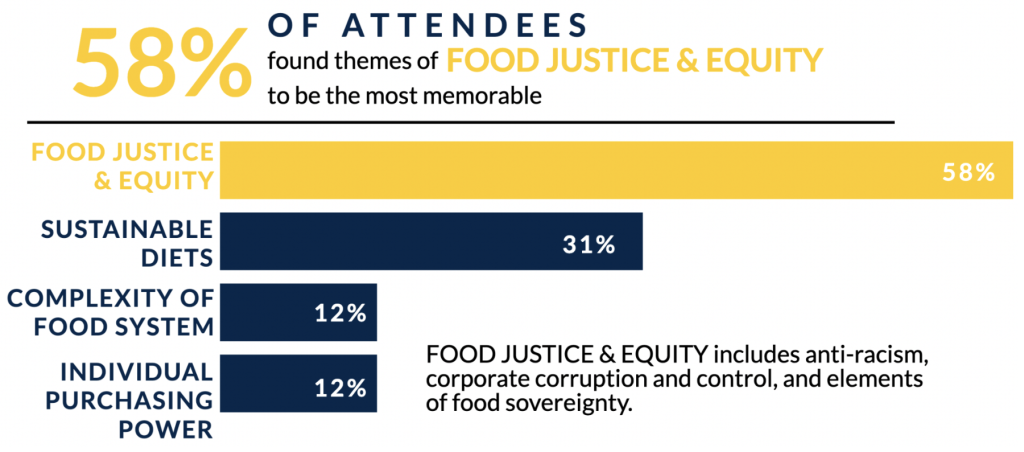
The memorable themes indicated by other respondents related to sustainable diets (31%), the complexity of the food system (12%), and individual purchasing power (12%). Other themes included food policy and planning (8%), food apartheid (8%), community and grassroots movements (6%), food sovereignty (5%), urban agriculture (5%), and respect for the planet and farmers (3%).
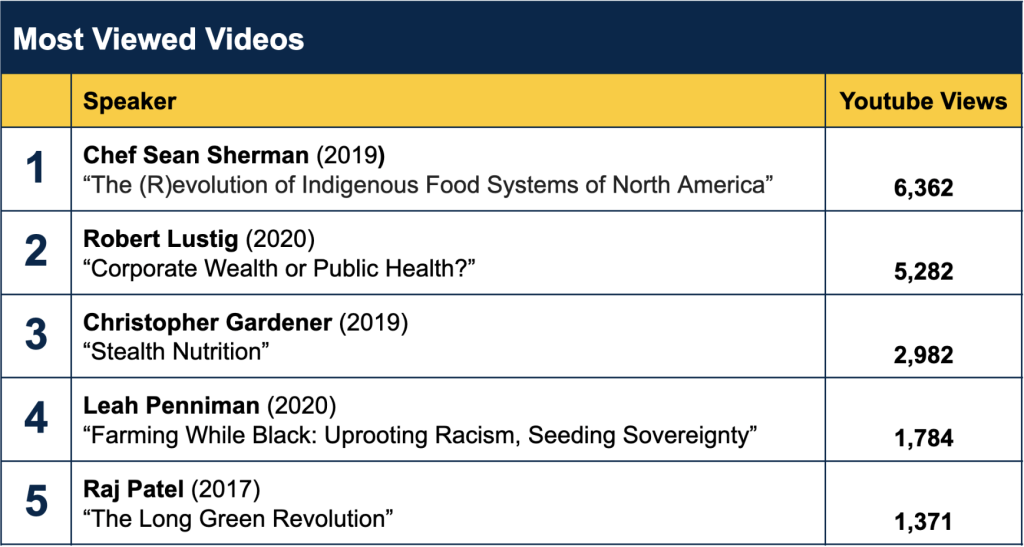

Food Literacy for All has been featured in several news outlets since the course debut in 2017.
- SEAS Events (Feb 2022) “Food Literacy for All Session – How the Other Half Eats: the Untold Story of Food and Inequality in America”
- Center for Academic Innovation (March 2021) “Food Literacy for All Brings New Cultural, Regional perspectives Together to Discuss a Just Food System”
- Engaged Michigan (April 2019) “Food Literacy: Why what we eat matters”
- Michigan Daily (Jan 2019) Food sustainability course brings in high profile speakers in a University-community partnership
- Click on Detroit (Jan 2019) “Food systems sustainability initiative Food Literacy for All kicks off its 2019 season”
- Metro Times (Dec 2018) “Food Literacy For All course will bring national leaders to Michigan for lecture series”
- ECurrent (Dec 2018) “Planting Seeds for Food Literacy”
- Click on Detroit (Jan 2018) “Food Literacy for All: U-M’s sustainable food course open to the public”
- It’s Hot in Here Podcast (Feb 2018) “The Founders of Food Literacy for All”
- University Record (Feb 2017) “New food systems course opens doors to community”

SFSI continues to seek long-term funding to ensure the longevity of Food Literacy for All. The primary source of Food Literacy for All funding has varied over the years.
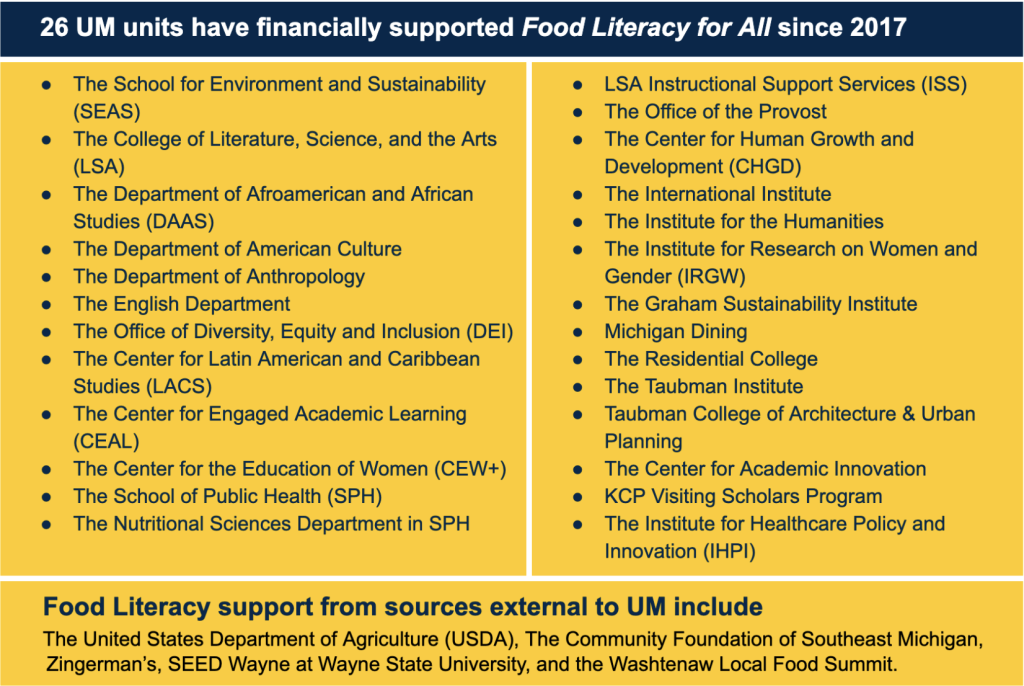
After six years of Food Literacy for All, student enrollment in the course remains high and keeps growing. Community engagement continues to expand and diversify, and the course continues to inspire, change perceptions, and even spark new partnerships.
Above all, Food Literacy for All is a model for innovation and collaboration. As former community co-instructor Malik Yakini reflected, “One of the most significant aspects of the Food Literacy for All course is that it modeled what a university/community partnership can look like.”

The following quotes are excerpts from an open-ended section of the post-course survey:
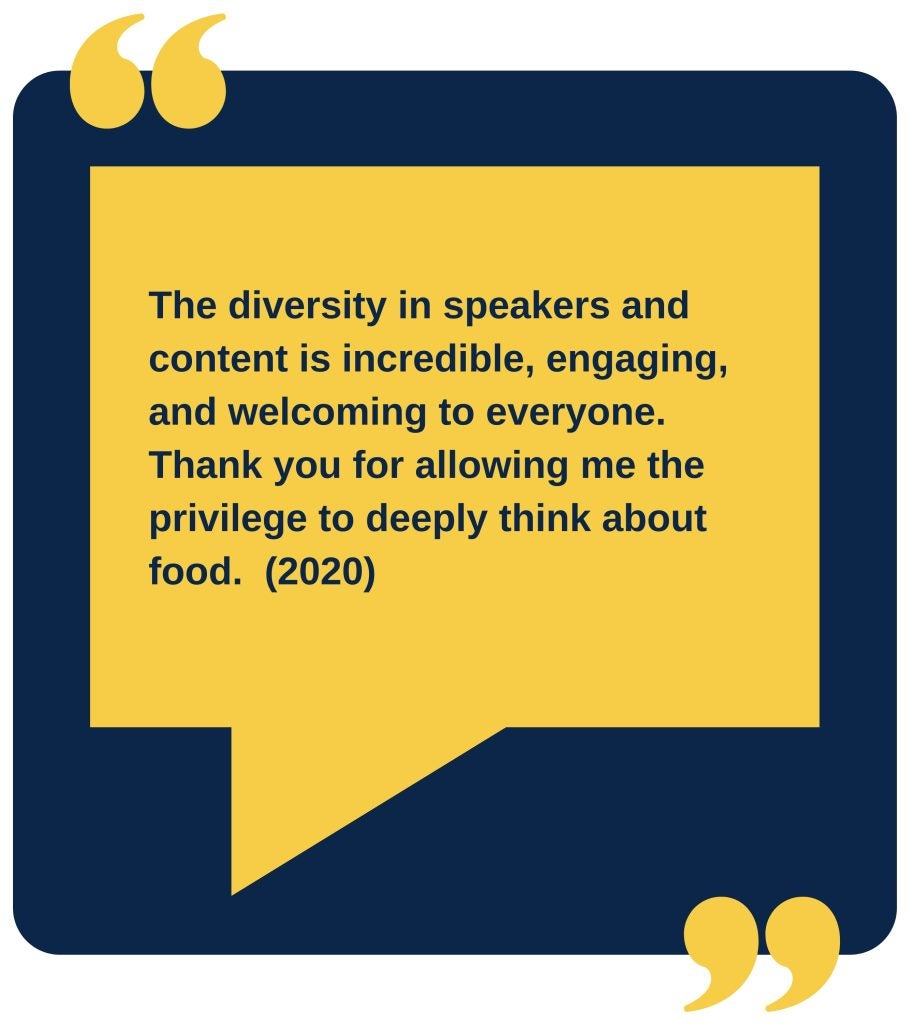
“I currently serve on the board of a nonprofit that focuses on fighting food insecurity and this has greatly impacted my cultural knowledge on food and shaped the way I look at many of the experiences our community has had.” (2022)
“I figured out food sovereignty is something I want to learn a lot more about! And chose a food minor because of this!” (2022)
“[This course] affirmed what I love about food and how passionate I am about changing the system.” (2022)
“[Food Literacy for All] showed me how many careers are possible with food systems work.” (2022)
“[Food Literacy for All taught me about] the strong connection between health outcomes, climate outcomes, and social justice outcomes, and how they are all connected through the food system.” (2020)
“I really liked the concept of this class, it was really cool to be able to just come and listen with low stakes assignments. I think I learned a lot and will definitely be recommending this class to others!” (2020)
“I enjoyed how this class was non-traditional, and how instead of receiving a lecture from the same professor every week I was able to hear from people with direct experiences.” (2020)
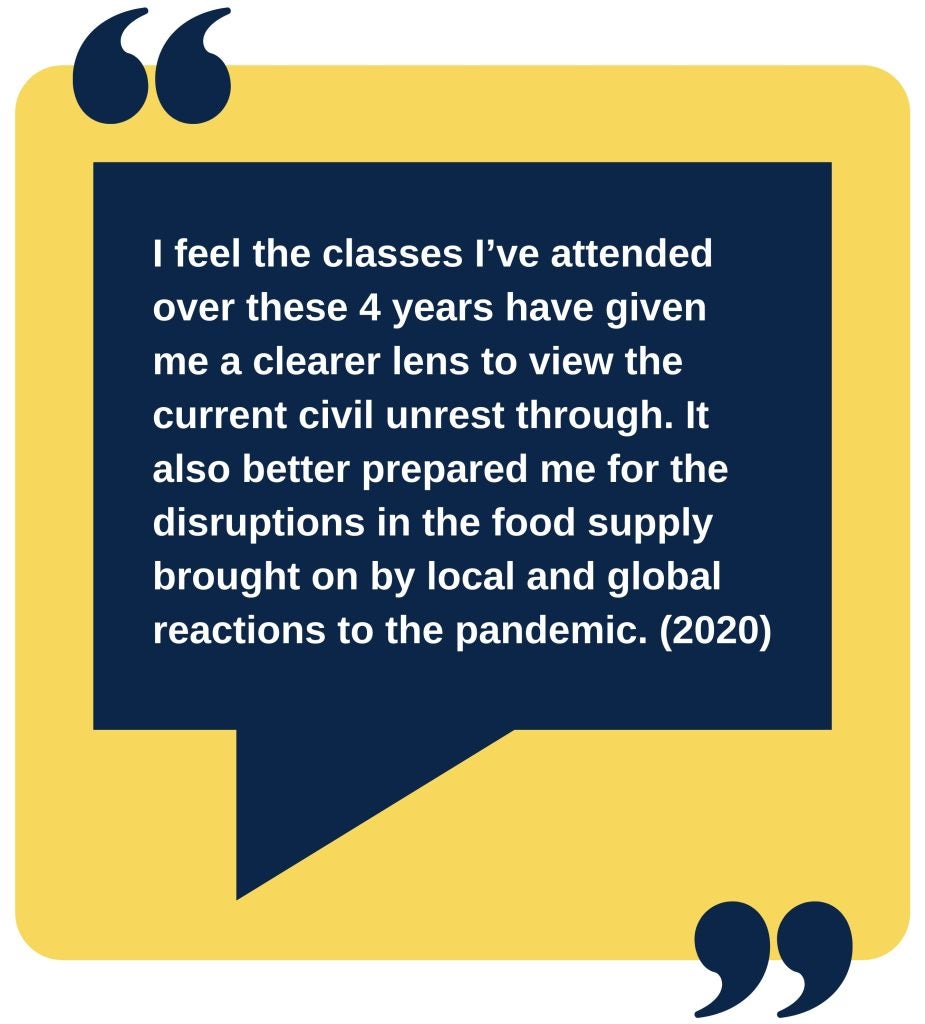
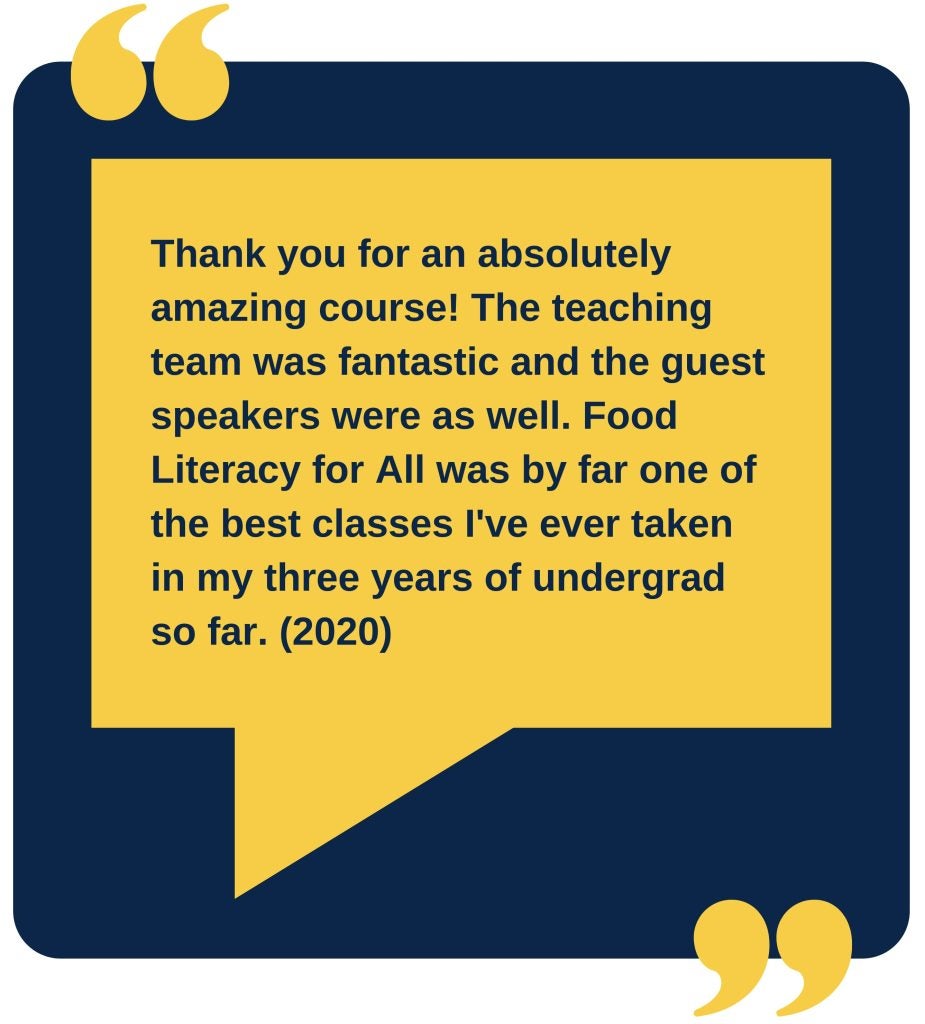
“I truly appreciate the preparation you all have put into making the course a success. The flexibility you all have shown as we moved from the classroom with video to all online was fabulous. You engaged wonderful lecturers and leaders of discussions. You closed the gap between academia and mainstream in a way that demonstrates how it is to both do and understand and synthesize. We make change in general with the hope for a better outcome, and the melding of the analytic, the empirical and the reduction to practice create an enriched learning experience. Thank you all!” (2020)
“Keep up the good work. This is prescient and long-overdue.” (2020)
“Great course! My whole family enjoyed the speakers and it sparked a lot of dinner table discussion.” (2020)
“You guys are amazing! This class is so special. It really sets the bar high for how community engaged learning can happen. Thank you!” (2020)
“Thank you for putting together such an amazing speaker series! I was also impressed at how you managed to get everyone doing virtual presentations so quickly.” (2020)
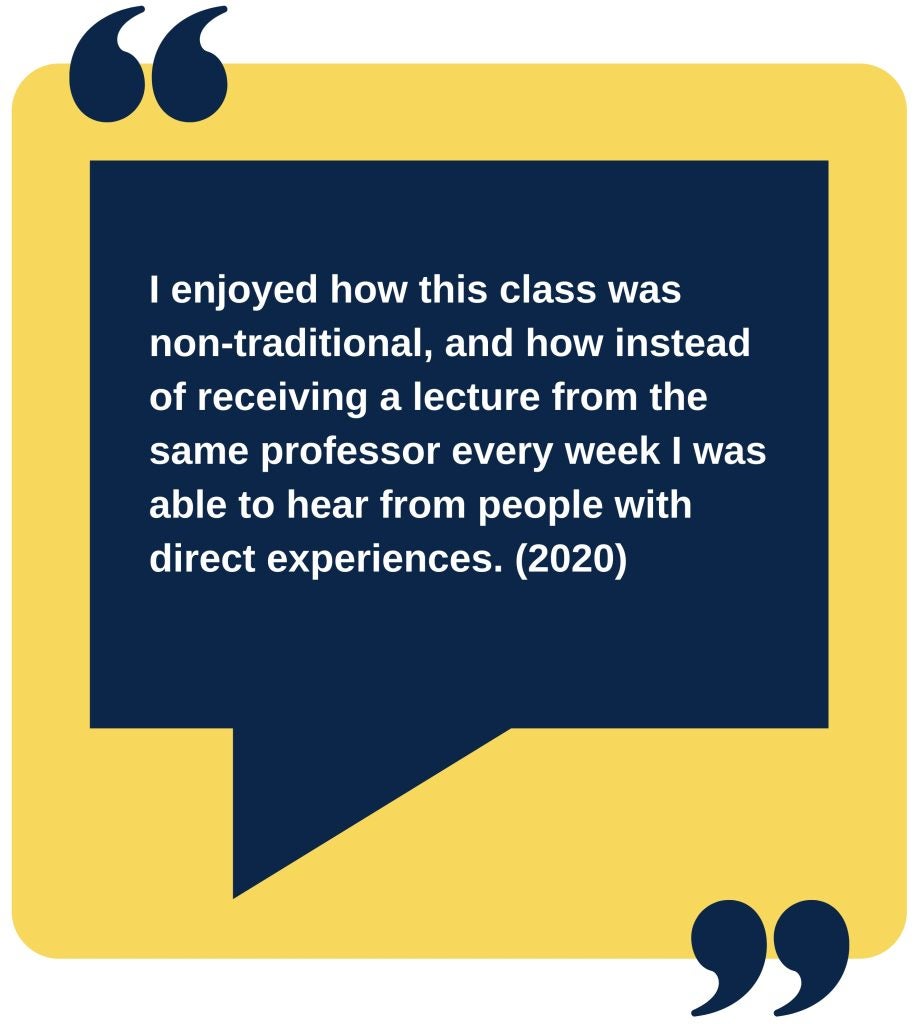
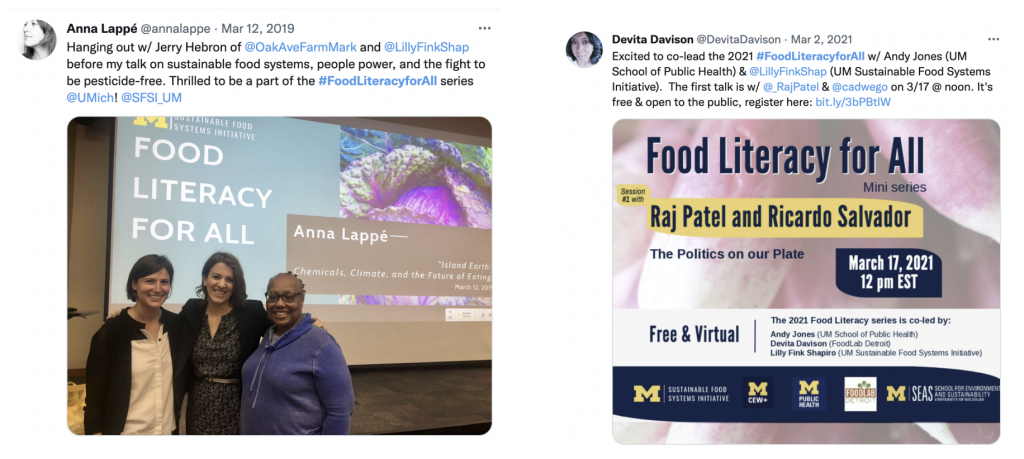
“I am FIRED UP after Saru’s talk this evening and willing to do whatever it takes to get One Fair Wage on the Michigan ballot. thanks much, I am overwhelmed by how much this class [Food Literacy for All] has given to me this semester” (2017)

“This course is incredible and added so much to my education here at Michigan. I hope to see it continue into the future.” (2018)
“I loved learning in a setting where community members are present and active members of both sides of dialogue. It was great to be able to have guest lecturers, but it was also pretty great that the community could join us in asking questions and continuing the dialogue of the lecture. My favorite class I’ve taken at this University for that reason, as well as the invaluable content.” (2018)
“Everything about this course was amazing. The speakers, the material, the vibe of the lecture hall. I know that my friends and I left inspired every week.” (2018)

“The variety of speakers that contributed to this course was incredible. I looked forward to Tuesday evenings since I knew I was going to walk out of class with a new perspective.” (2018)
“This class has been very valuable resource to my understanding of how broken the food system and, frankly, our society have become. Please keep this class going because more people should be given the same opportunity to understand the food system and potential avenues for change that that this class reveals” (2018)
“I am exploring what are my options for a career change, and this course helps me to see multiple ways to positively impact food systems and justice work.” (2019)

“I didn’t know as much about food justice before but I would like that to be a core part of my career.” (2019)
“[This course] has been fuel for my continued interest in urban sustainability.” (2019)
“[Food Literacy for All] has made me think deeply about how my work influences food systems and climate justice.” (2023)

Food Literacy for All was evaluated in the following ways:
- A 10-question online RSVP form that community attendees were required to complete before each
session that they attended (2017-2020). In 2022 participants completed an 8 question survey
connected to the webinar registration. - A post-course survey was sent to all community attendees and enrolled students at the end of the
semester. In 2022, n=168 In 2020, n=95, in 2019, n=182, in 2018, n= 138 , and in 2017, n=30. - An anonymous teaching evaluation was sent to all enrolled students by the office of the registrar. In
2019, 69 of the 146 enrolled students responded to this survey for a 47% response rate. In 2018, 57 of
the 122 enrolled students responded to the survey for a 47% response rate. In 2017, 67 of the 135
enrolled students responded to the survey for a 50% response rate. - Analysis of remote engagement via youtube analytics, data provided by UM Informational technology
services (ITS), and zoom webinar reports.


